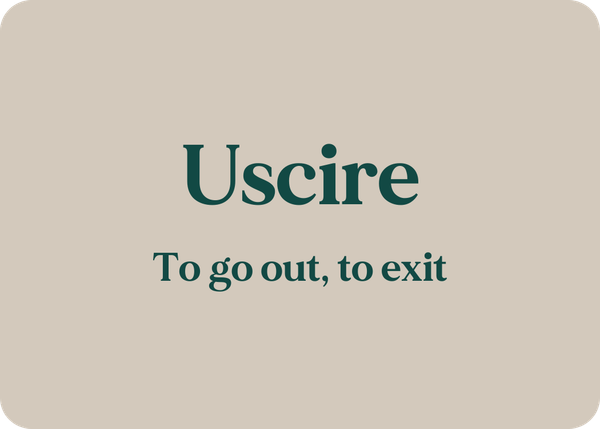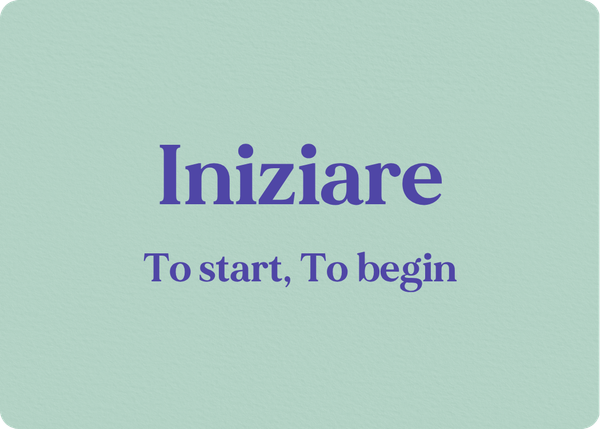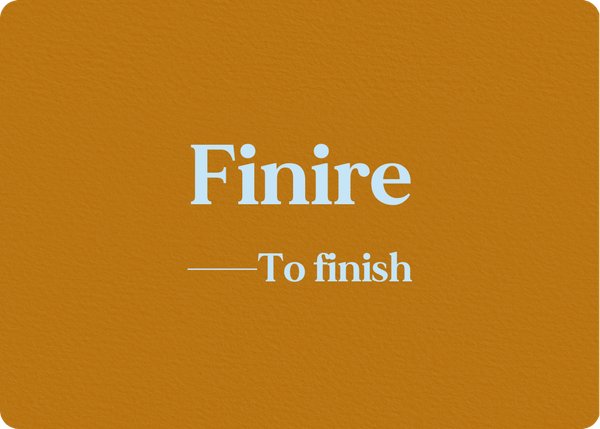What is Uscire?
Uscire is an Italian verb meaning "to go out," "to exit", or "to leave". It belongs to the third conjugation (-IRE verbs) and is irregular in some tenses. This verb is useful for everyday Italian conversation, from describing going out of places to expressing leaving buildings, exiting situations, and socializing.
Key Features of Uscire:
- Type: Irregular third conjugation verb (-IRE)
- Meaning: To go out, to exit, to leave, to come out
- Irregularities: Present tense (esco, etc.), present subjunctive (esca, etc.), imperative (esci, etc.)
- Auxiliary verb: Uses "essere" (to be) for conjugation in compound tenses
- Past participle: Uscito
Indicativo – Indicative Mood
Presente (Present Tense)
| Person | Conjugation |
|---|---|
| io | esco |
| tu | esci |
| lui/lei | esce |
| noi | usciamo |
| voi | uscite |
| loro | escono |
Example:
Ogni mattina esco di casa alle otto.
Every morning I leave the house at eight.
Passato Prossimo (Present Perfect)
| Person | Conjugation |
|---|---|
| io | sono uscito/a |
| tu | sei uscito/a |
| lui/lei | è uscito/a |
| noi | siamo usciti/e |
| voi | siete usciti/e |
| loro | sono usciti/e |
Example:
Lucia e Anna sono uscite insieme per fare shopping.
Lucia and Anna went out together to go shopping.
Imperfetto (Imperfect)
| Person | Conjugation |
|---|---|
| io | uscivo |
| tu | uscivi |
| lui/lei | usciva |
| noi | uscivamo |
| voi | uscivate |
| loro | uscivano |
Example:
Da ragazza, uscivo ogni weekend.
As a girl, I used to go out every weekend.
Trapassato Prossimo (Past Perfect)
| Person | Conjugation |
|---|---|
| io | ero uscito/a |
| tu | eri uscito/a |
| lui/lei | era uscito/a |
| noi | eravamo usciti/e |
| voi | eravate usciti/e |
| loro | erano usciti/e |
Example:
Quando sono tornato a casa, Marzia era già uscita.
When I got home, Marzia had already gone out.
Passato Remoto (Simple Past)
| Person | Conjugation |
|---|---|
| io | uscii |
| tu | uscisti |
| lui/lei | uscì |
| noi | uscimmo |
| voi | usciste |
| loro | uscirono |
Example:
Ricordo che quella mattina uscimmo di casa all'alba.
I remember that that morning we went out of the house at dawn.
Trapassato Remoto (Past Anterior)
| Person | Conjugation |
|---|---|
| io | fui uscito/a |
| tu | fosti uscito/a |
| lui/lei | fu uscito/a |
| noi | fummo usciti/e |
| voi | foste usciti/e |
| loro | furono usciti/e |
Example:
Quando fu uscita dal tribunale, tirò un sospiro di sollievo.
When she had come out of the courthouse, she let out a sigh of relief.
Futuro Semplice (Simple Future)
| Person | Conjugation |
|---|---|
| io | uscirò |
| tu | uscirai |
| lui/lei | uscirà |
| noi | usciremo |
| voi | uscirete |
| loro | usciranno |
Example:
Dopo cena usciremo a fare una passeggiata.
After dinner we will go out for a walk.
Futuro Anteriore (Future Perfect)
| Person | Conjugation |
|---|---|
| io | sarò uscito/a |
| tu | sarai uscito/a |
| lui/lei | sarà uscito/a |
| noi | saremo usciti/e |
| voi | sarete usciti/e |
| loro | saranno usciti/e |
Example:
Quando Simona sarà uscita dalla riunione, ci raggiungerà al bar.
When Simona has left the meeting, she will join us at the bar.
Congiuntivo – Subjunctive Mood
Presente (Present Subjunctive)
| Person | Conjugation |
|---|---|
| che io | esca |
| che tu | esca |
| che lui/lei | esca |
| che noi | usciamo |
| che voi | usciate |
| che loro | escano |
Example:
Spero tanto che tu esca con noi stasera.
I really hope you come out with us tonight.
Passato (Past Subjunctive)
| Person | Conjugation |
|---|---|
| che io | sia uscito/a |
| che tu | sia uscito/a |
| che lui/lei | sia uscito/a |
| che noi | siamo usciti/e |
| che voi | siate usciti/e |
| che loro | siano usciti/e |
Example:
Non credo che Simone e Benedetta siano usciti insieme ieri.
I don’t think that Simone and Benedetta went out together yesterday.
Imperfetto (Imperfect Subjunctive)
| Person | Conjugation |
|---|---|
| che io | uscissi |
| che tu | uscissi |
| che lui/lei | uscisse |
| che noi | uscissimo |
| che voi | usciste |
| che loro | uscissero |
Example:
Avrei gradito che uscissi almeno per un saluto.
I would’ve appreciated it if you’d at least come out to say hello.
Trapassato (Past Perfect Subjunctive)
| Person | Conjugation |
|---|---|
| che io | fossi uscito/a |
| che tu | fossi uscito/a |
| che lui/lei | fosse uscito/a |
| che noi | fossimo usciti/e |
| che voi | foste usciti/e |
| che loro | fossero usciti/e |
Example:
Se noi fossimo usciti insieme, ci saremmo divertiti di più.
If we had gone out together, we would have had more fun.
Condizionale – Conditional Mood
Presente (Present Conditional)
| Person | Conjugation |
|---|---|
| io | uscirei |
| tu | usciresti |
| lui/lei | uscirebbe |
| noi | usciremmo |
| voi | uscireste |
| loro | uscirebbero |
Example:
Uscirei volentieri, ma ho troppo lavoro arretrato.
I’d love to go out, but I’ve got too much work piled up.
Passato (Past Conditional)
| Person | Conjugation |
|---|---|
| io | sarei uscito/a |
| tu | saresti uscito/a |
| lui/lei | sarebbe uscito/a |
| noi | saremmo usciti/e |
| voi | sareste usciti/e |
| loro | sarebbero usciti/e |
Example:
Claudio sarebbe uscito con noi, ma non si sentiva bene.
Claudio would have gone out with us, but he didn’t feel well.
Imperativo (Imperative)
| Person | Conjugation |
|---|---|
| (tu) | esci |
| (lui/lei) | esca |
| (noi) | usciamo |
| (voi) | uscite |
| (loro) | escano |
Example:
Esci subito da qui!
Get out of here right now!
Indefinite Moods
Infinito (Infinitive)
- Presente (Present): uscire (to go out)
- Passato (Past): essere uscito (to have gone out)
Examples:
Mi piace uscire presto la mattina.
I like going out early in the morning.
Credo di essere uscito dalla porta sbagliata.
I think I walked out the wrong door.
Participio (Participle)
- Presente (Present): uscente (outgoing/leaving) - used as adjective
- Passato (Past): uscito (gone out)
Examples:
Il presidente uscente ha tenuto il suo ultimo discorso.
The outgoing president gave his last speech.
I ragazzi sono usciti in giardino a giocare.
The boys went out into the garden to play.
Gerundio (Gerund)
- Presente (Present): uscendo (going out)
- Passato (Past): essendo uscito (having gone out)
Examples:
Uscendo di casa, ho incontrato il mio vicino.
While leaving the house, I met my neighbor.
Essendo usciti presto, abbiamo evitato il traffico.
Having left early, we avoided the traffic.
The verb Uscire at a glance: Key tenses you need
| Present | Present Perfect | Imperfect | Present Subjunctive | Imperfect Subjunctive | Present Conditional |
|---|---|---|---|---|---|
| io esco | io sono uscito/a | io uscivo | che io esca | che io uscissi | io uscirei |
| tu esci | tu sei uscito/a | tu uscivi | che tu esca | che tu uscissi | tu usciresti |
| lui/lei esce | lui/lei è uscito/a | lui/lei usciva | che lui/lei esca | che lui/lei uscisse | lui/lei uscirebbe |
| noi usciamo | noi siamo usciti/e | noi uscivamo | che noi usciamo | che noi uscissimo | noi usciremmo |
| voi uscite | voi siete usciti/e | voi uscivate | che voi usciate | che voi usciste | voi uscireste |
| loro escono | loro sono usciti/e | loro uscivano | che loro escano | che loro uscissero | loro uscirebbero |
Conclusion
Mastering the conjugation of "uscire" is useful for expressing movement and social activities in Italian. As an irregular third conjugation verb, it requires attention to its irregular forms and its distinctive stem changes from "usc-" to "esc-" in certain forms.
Remember the key points:
- Uses "essere" as auxiliary verb in compound tenses
- Irregular in certain forms
- Past participle is "uscito"
- Essential for describing going out, exiting places, and socializing
Keep practicing with real sentences and contextual examples to master this Italian verb!





